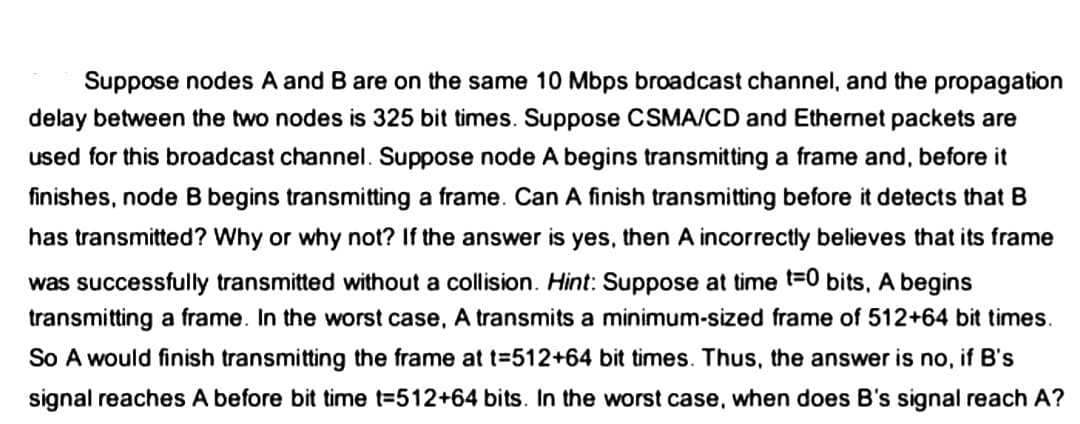Suppose nodes A and B are on the same 10 Mbps broadcast channel, and the propagation delay between the two nodes is 325 bit times. Suppose CSMA/CD and Ethernet packets are used for this broadcast channel. Suppose node A begins transmitting a frame and, before it finishes, node B begins transmitting a frame. Can A finish transmitting before it detects that B has transmitted? Why or why not? If the answer is yes, then A incorrectly believes that its frame was successfully transmitted without a collision. Hint: Suppose at time t=0 bits, A begins transmitting a frame. In the worst case, A transmits a minimum-sized frame of 512+64 bit times. So A would finish transmitting the frame at t=512+64 bit times. Thus, the answer is no, if B's signal reaches A before bit time t=512+64 bits. In the worst case, when does B's signal reach A?
Suppose nodes A and B are on the same 10 Mbps broadcast channel, and the propagation delay between the two nodes is 325 bit times. Suppose CSMA/CD and Ethernet packets are used for this broadcast channel. Suppose node A begins transmitting a frame and, before it finishes, node B begins transmitting a frame. Can A finish transmitting before it detects that B has transmitted? Why or why not? If the answer is yes, then A incorrectly believes that its frame was successfully transmitted without a collision. Hint: Suppose at time t=0 bits, A begins transmitting a frame. In the worst case, A transmits a minimum-sized frame of 512+64 bit times. So A would finish transmitting the frame at t=512+64 bit times. Thus, the answer is no, if B's signal reaches A before bit time t=512+64 bits. In the worst case, when does B's signal reach A?
Principles of Information Security (MindTap Course List)
6th Edition
ISBN:9781337102063
Author:Michael E. Whitman, Herbert J. Mattord
Publisher:Michael E. Whitman, Herbert J. Mattord
Chapter6: Security Technology: Access Controls, Firewalls, And Vpns
Section: Chapter Questions
Problem 2RQ
Related questions
Question

Transcribed Image Text:Suppose nodes A and B are on the same 10 Mbps broadcast channel, and the propagation
delay between the two nodes is 325 bit times. Suppose CSMA/CD and Ethernet packets are
used for this broadcast channel. Suppose node A begins transmitting a frame and, before it
finishes, node B begins transmitting a frame. Can A finish transmitting before it detects that B
has transmitted? Why or why not? If the answer is yes, then A incorrectly believes that its frame
was successfully transmitted without a collision. Hint: Suppose at time t=0 bits, A begins
transmitting a frame. In the worst case, transmits a minimum-sized frame of 512+64 bit times.
So A would finish transmitting the frame at t=512+64 bit times. Thus, the answer is no, if B's
signal reaches A before bit time t=512+64 bits. In the worst case, when does B's signal reach A?
Expert Solution
This question has been solved!
Explore an expertly crafted, step-by-step solution for a thorough understanding of key concepts.
This is a popular solution!
Trending now
This is a popular solution!
Step by step
Solved in 2 steps

Knowledge Booster
Learn more about
Need a deep-dive on the concept behind this application? Look no further. Learn more about this topic, computer-science and related others by exploring similar questions and additional content below.Recommended textbooks for you

Principles of Information Security (MindTap Cours…
Computer Science
ISBN:
9781337102063
Author:
Michael E. Whitman, Herbert J. Mattord
Publisher:
Cengage Learning

Principles of Information Security (MindTap Cours…
Computer Science
ISBN:
9781337102063
Author:
Michael E. Whitman, Herbert J. Mattord
Publisher:
Cengage Learning